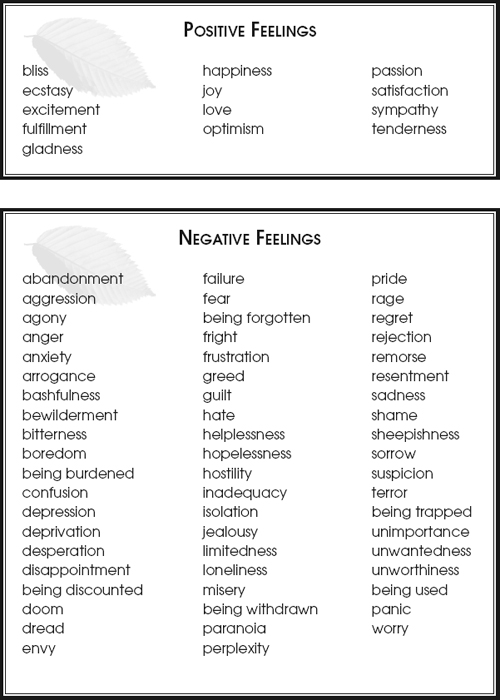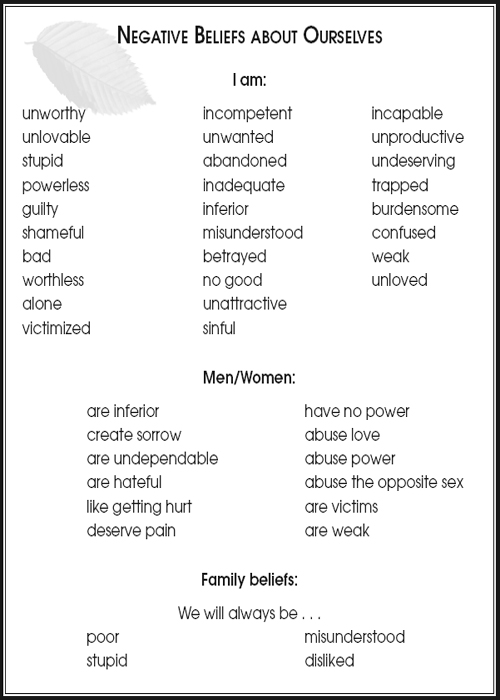
Let us be willing to release old hurts.
—Martha Smock
As a psychic and a healer, I am often called upon to help clients release their negative or unresolved feelings or painful memories of the past (including memories of other lives). These are stored in our bodies until we resolve them. They are the roots of our physical problems, and their role should not be minimized. The unresolved emotional pain that we are storing inside affects our lives profoundly, threatening our health and our happiness.
Many of us are afraid or embarrassed to express our feelings, so instead, we stuff them deep down, where we hope they won't cause any trouble. We don't let our sadness or anger or fear or bitterness show. Doing so might make us feel vulnerable, out of control. We're afraid that someone is going to make fun of us. Someone might call us a big baby or tell us that we are too sensitive, too emotional, or too dramatic.
What are your responses when someone starts talking to you about your feelings, your past, or your memories? Do you want to go smoke a pack of cigarettes or eat an entire chocolate cake? Maybe run off to the bingo parlor or the nearest casino? Park yourself on the couch with some junk food and turn on the tube? Maybe smoke a few joints or fix a few cocktails? Run out and do some shopping? I think I have had nearly every one of these responses when I have not wanted to feel my feelings.
What we may not realize is that stuffing our feelings, refusing to release them, just gives them more power.
Like many others, I have gone from one extreme to the other in dealing with my emotions. I used to believe my feelings would take control of my life if I allowed myself to experience them. I had so much anger that I was sure I would kill someone if I let it out. I had so much sadness, I thought I would cry a river if I ever shed a single tear. I also had a lot of guilt and shame. I didn't think that I could bear to look at all the reasons for these feelings. And so I tried my best to avoid them.
When we are in emotional pain, there are many ways to dull it. Most of us spend thousands of hours finding ways to hide from our pain. Distractions are everywhere. Even religion can be used as a distraction for avoiding our stored feelings and negative beliefs.
Do I mean that every feeling you ever had, or that you never expressed, is sitting inside your body? No, not every feeling. I am talking about a particular category of feelings, mainly those associated with events in your life that have created or are reinforcing negative beliefs you have about yourself.


The words listed on the top of page 53 are often used to describe positive situations or feelings. When these are felt and experienced in our lives they are a source of health. The words at the bottom of page 53 are often used to describe negative situations or feelings. These reinforce negative beliefs about yourself and keep you going in circles. As you go through this second list, you will probably find that you have a strong response to some of the words while you have little or no response to others. Make a note of which words elicit the strongest response.
These are the words that represent your negative belief system. As long as they are there, they can keep you stuck in a bad job or an abusive or unhappy relationship. They can be at the root of financial troubles or poor health. If you do nothing to change them, they will sit in your body and affect the rest of your life just as they affected your past.
Now let's explore how all of this works. Let's say that I believe I am incapable of making a wise decision. Possibly one of my parents or a teacher said that to me once, or repeatedly, and I have held on to it, believing it to be true. Now, let's say a situation comes up in daily life when I need to make a decision. Panic or anger about making a wrong decision are two feelings that might come up immediately for me. I might also feel foolish, ashamed, guilty, depressed, or as if I were a failure. I may feel resentful toward the person or situation forcing me to make the decision.
The problem comes when I internalize all of these feelings and beliefs. I know this is happening because I get a tight stomach or maybe a sudden headache, a spastic colon, or a pain in the back of my neck. I go through this physical, mental, and emotional torture because I have this belief that I am incapable of making a wise decision. Furthermore, I don't feel comfortable expressing my negative feelings, such as anger, humiliation, shame, guilt, or sadness. So I just keep the whole mess inside. The belief is in there along with all the feelings I have surrounding that belief. Usually, it adds up to physical trouble somewhere in my body!
Here's another example: I have a belief that I am unlovable. No one would really love me for who I am. I do everything that I can to look lovable. I spend lots of money on my outside appearance. Every time I see someone I am interested in, I get anxious or even panicky. I pretend not be interested in him because I don't want him or anyone else to know how anxious I really am. He gets the message that I'm not interested in him, and so he leaves me alone. This reinforces my feelings of inadequacy, fear, and panic, as well as my belief that I am unlovable. I continue to feel alone, unloved, and misunderstood.
Feelings trigger the beliefs, and the beliefs trigger the negative feelings. Back and forth they go, like a Ping-Pong ball! Those beliefs sit inside, controlling our lives, affecting our worlds outside as well as within. As in the example above, they dictate our actions in the external world so that whatever occurs seem to validate our feelings.
If we are unable to express our feelings, they fester inside. As Woody Allen once said, “I don't get angry, I grow tumors instead.”
Most people, I've found, intuitively understand this process. In an article published in the Minneapolis Star Tribune, a reporter interviewed grade-school children. He asked them how they handled stress. One eleven-year-old boy said, “I don't handle my worries. I just let them hurt me inside.”
How insightful and how sad! The majority of us find it easier to store negative feelings than to go through the painful process of releasing them. Illness is a way to get to know ourselves. It is a tool to change the course of our lives, a way to find freedom from the past. Pain, illness, and disease are our bodies’ way of saying, “Help me to get unstuck. Help me to be free.”
Sometimes, when we don't know what to do with our feelings, they can seem overwhelming. But how can you release your feelings in a way that makes you feel safe and that doesn't threaten those you are closest to? When feelings are buried deep, what is the best way to access them? Here are eight techniques I have used in my healing practice that you may find helpful:
1. Write a letter. If you find that you are really angry with another person or an institution, or you have certain feelings (hatred, resentment, sadness, etc.), write a letter. You donot need tomail it!The important thing is that you express exactly how you feel about that person or institution.
2. Get support. Share what you are feeling with a counselor or trusted friend. Sometimes we want someone to hear our feelings, though this is not always the person with whom we have a grievance.
3. Role-play. Place a chair in front of you, and pretend the person or institution is sitting in it. You might even tape his picture to the back of the chair. Say everything that you have ever wanted to say to this person about what he did to you. Don't worry about his feelings. Take care of your own! If this is someone who has abused you in some way, visualize giving back to the offender the shame, pain, and humiliation he gave to you. Don't worry about being impolite or behaving in an “inappropriate” way. Your first priority right now is you and your feelings.
4. Let it out. Sometimes, when I get really angry with someone or something, I get into my car and drive to a place where I am alone. I yell and scream as loud as I need to. I say everything I need to, until I feel an inner release of the emotions. It really works!
Get a plastic bat (available at toy stores) and beat your bed, couch, or a strong pillow with it. Use something soft so you won't hurt your hands.
5. Sing out loud. Turn up the music and sing along with it, as loudly and as outrageously as you want! It's a great release! Play some of the oldies. Get those memories going. Sing!
6. Shed some tears. Put on sad music, go to a sentimental movie, wallow in old memories, whatever you need to do. Just let those tears out!
7. Do something physical. This could be dancing, jogging, running, swimming, walking fast, playing a sport, bicycling, or doing yard work. Running on the treadmill with classical music turned up really loud is what I love to do when I'm feeling stressed, overwhelmed, or angry. Anything physical really helps!
8. Go outside. Be out in nature. You will feel more grounded. You might work in a garden, mow the grass, rake the leaves, shovel snow, or go for a nature walk. If you can be outdoors and talk it out to the Universe—to the trees, birds, flowers, and rocks—it will really help to work that anxiety, fear, and anger out of your body.
Often, we hurt ourselves physically and emotionally because of unresolved feelings. This might include hitting, biting, cutting, or scratching yourself. It might include ramming your fist into the wall (hurting yourself more than the wall). It might include abusing yourself with your addictions—overeating, drinking, using drugs, overworking, spending too much money or money you don't have, or unnecessarily throwing yourself into situations that cause even more stress.
When it comes to self-punishment, most of us are very resourceful. Have you ever been exhausted but wouldn't accept it? You just kept on pushing and pushing and pushing. Or you may have sabotaged a job offer or a relationship that you really wanted but didn't feel you deserved. Again, you were punishing yourself because of unresolved feelings.
One of the most important points in this book is that your stored inner pain, memories, and beliefs have hurt you enough. It is time to stop the pain! If you come up against feelings in the exercises in this chapter that you don't know what to do with, for goodness sake don't continue to punish yourself! There are ways to get those feelings out besides hitting, starving, or stuffing yourself; creating an illness; or acting them out in ways that will only cause more dis-ease in your life.
Start now to break those old, destructive, and hurtful patterns of taking unresolved pain out on yourself. After you've released some of your feelings, give yourself a break. Praise yourself for doing good work, for possibly closing a chapter in your life.